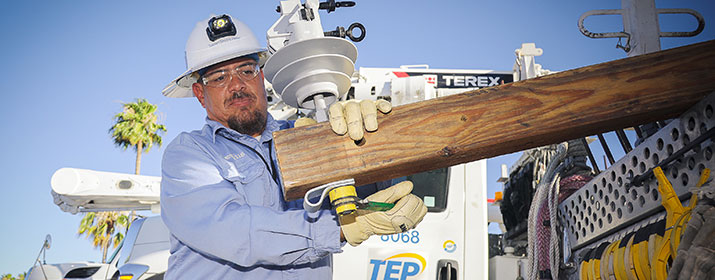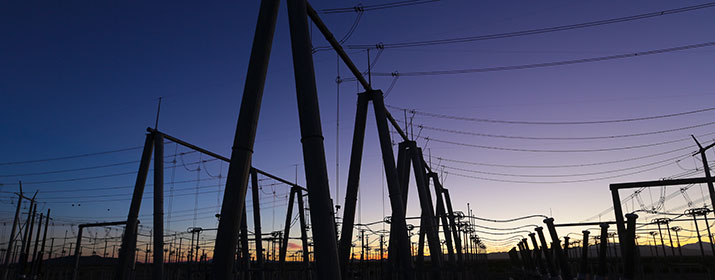
Eddie Morales knew he wanted to be a lineworker for Tucson Electric Power after watching our crews change out a lightning-damaged transformer that fed his father’s home.
“I thought that was the coolest thing I’ve ever seen. I decided right then that’s what I wanted to do,” recalled Morales, a Crew Leader and 14-year Journeyman for TEP.
Morales is among TEP’s nearly 100 lineworkers – journeymen, apprentices, crew and team leaders, and troublemen – who serve as sentinels for our electrical grid. They’re constantly working to maintain, repair and upgrade our 1,500 miles of transmission lines and nearly 12,000 miles of distribution lines and system equipment.
Whether in sunny, blue skies or punishing storms, TEP crews are on the job 24/7 to keep the power flowing to Tucson’s critical service providers, homes and businesses. While most of us head indoors when storms roll in, our line crews roll out on a moment’s notice to respond to any outages.
The role can be romanticized, as in Glen Campbell’s 1968 song, “Wichita Lineman,” and the 2015 movie, “Life on the Line” starring John Travolta. In reality, though, the work is physically demanding and often dangerous.
Line crews work with voltages as high as 500 kilovolts, sometimes while being lifted high above the treetops or squeezing into dark, cramped quarters, such as underground vaults. They’re also subject to extreme heat, wind, torrents of rain and the occasional rattlesnake that finds its way into our equipment.
Workers must have the physical strength to lift and pull heavy cable and conduit and scramble up poles if needed. Although using personal protection gear is essential for safety, it’s often cumbersome, hot to wear and restricts movement.
“The work and conditions do take their toll,” admitted Morales,” but I do my best to eat healthy, stay hydrated and rest up between jobs.”
Lineworkers typically work a 10-hour day, but their shift can stretch up to 16 hours if emergency repairs are needed. That was the case two years ago, when a raging storm in southern Pima County toppled 80 poles. Many lineworkers put in very long days for a week’s time to restore power to thousands of homes and businesses that faced an extended outage.
Long shifts with overtime often mean a lot of missed family events and special occasions, which is no small sacrifice. “Time away from my family is the hardest part of the job,” Morales said. “I’ve missed a few birthdays and my kids’ baseball and football games. It can be hard on my family, but they understand that if our lights were out, we’d want power restored quickly, too.”
On the upside, spending so much time with your coworkers also creates a strong bond. “We trust each other with our lives” Morales added. “We watch out to keep each other safe because they are our work family.”
Troublemen, like Dustin Christmas, also are an important part of the lineworkers’ family. They arrive on the scene first when there’s a problem to determine the cause and to coordinate needed crews and resources to make repairs. While Christmas says he takes the challenges of his job in stride, he also knows the community is counting on our crews.
“Our job is to restore power as quickly and safely as possible. We have an obligation to keep the lights on,” he said. “When customers are out of power, they’re very happy to see TEP crews roll up, but often multiple teams – such as design, warehouse and heavy equipment – are mobilized and working behind the scenes to support our restoration efforts.”
Because TEP and other utilities rely on a corps of highly skilled craft trade workers, such as journeymen, our company has stepped up efforts to recruit and groom the next generation of lineworkers. TEP offers a clear pathway for employees to transition from a craft trainee intern to a full journeyman, which can take five years.
“We work closely with career counselors and participate in job and science fairs to share with students and young adults all of the craft trade possibilities in the energy industry,” said Joanne Kingman, TEP Training Supervisor. “TEP also partners with Pima Community College to support their Get into Energy Program and their Energy Technology Certificate Program, which gives students the basic skills and hands-on learning to prepare them for entry level positions at our company.”
Despite the strenuous and hazardous work, long hours and challenging work conditions, Morales and Christmas said there is nothing else they’d rather be than a lineworker.
“For me it’s a point of pride in serving our customers,” Morales said. “That’s what motivates me every day.” Added Christmas, “I’d do exactly the same thing that I’m doing now. I like being a lineman, the job and the challenge.”






